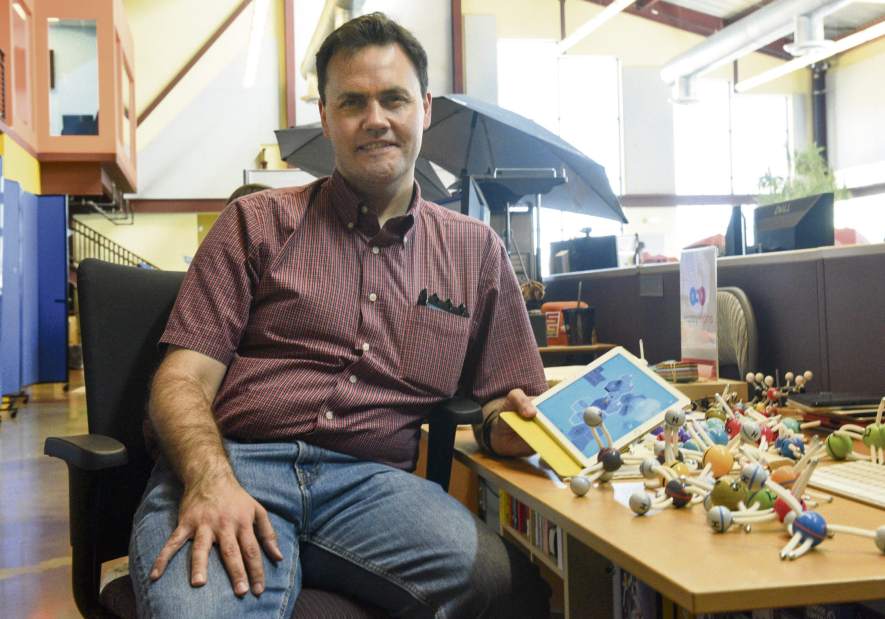https://archive.triblive.com/business/local-stories/south-side-video-game-maker-sees-vr-as-next-big-thing/
South Side video game maker sees VR as next big thing

Andrew Russell | Tribune-Review
Jesse Schell, CEO of Pittsburgh video game studio Schell Games, shows the company's latest game, 'Happy Atoms,' for which the company is trying to raise $50,000 through crowd-funding website Indiegogo.
Jesse Schell predicts virtual reality video games will be one of the hottest Christmas gifts this year.
Half his South Side studio Schell Games is developing the immersive technology, which he said makes players feel as though they are in the world of the video game.
But Schell, CEO of the 100-employee company he founded in 2002, doesn't put all his eggs in one basket. The company makes mobile and website games, interactive displays for theme parks and museums and educational games. One of its customers is the Fred Rogers Co.
One of its newest educational creations is Happy Atoms, which combines a tablet or smartphone interface with magnetic models of atoms aimed at helping children learn chemistry. Schell Games launched a crowdfunding campaign on Indiegogo for Happy Atoms last month — it was 70 percent toward its goal Monday — to help offset manufacturing costs and get some early marketing for the product.
Schell, who started working on virtual reality technology in the 1990s at Carnegie Mellon University and then at The Walt Disney Co., discussed the future of video games and the challenges of developing games for mobile during a recent interview with the Tribune-Review. Below are edited excerpts.
Trib: How much are you looking to raise on Indiegogo for Happy Atoms?
Schell: The goal is $50,000, which is fairly modest, but it helps cover a lot of the manufacturing costs. But then we have a number of different stretch goals (targets above $50,000), which if we hit those then we can add more features. One that's really big right now is we've committed to having the software run on iPhone and iPad. We'd love to have it run on Android, but there's a lot of expense in testing all those different cameras. So that's our first stretch goal.
Trib: I never thought of that as a complication, that you have to test your software on all the different Android devices?
Schell: It's a nightmare. It's why so many things come out on iPhone first, because of the testing. All it takes to really mess up your product launch is three or four individuals (rating it) “one star, doesn't work.” Even though it doesn't work for you because you've got some weird phone from God knows where that was made six years ago and you haven't updated your (operating system) in three years. We've learned to gird up for it and not jump in until we're sure that we can make it work.
Trib: How big are mobile games for Schell Games?
Schell: Honestly, I don't want to say that it came and went, but for awhile it was dominating what we were doing. At the moment, virtual reality is the hot stuff. If you look at all the projects we've ever come out with, the most are mobile projects. But of the projects we have in development now, we have eight virtual reality projects. More than half the studio is working on virtual reality projects right now.
Trib: Why is that?
Schell: People see that 2016 is going to be the year of virtual reality. There are so many systems coming out and they're so good. We put out early prototypes of our games, and they've gotten us some big support and we've won awards. Our “I Expect You to Die” game has already won four awards.
Trib: So, what about systems that will soon be hitting the market for consumers?
Schell: This Christmas is when we're really going to see it. The one that will make the biggest splash in the market will be the PSVR (Sony's PlayStation Virtual Reality game system). That will be the highest-quality affordable system.
Trib: So virtual reality is going to be the must-have electronic toy of 2016?
Schell: I personally think it's going to dominate a lot of the Christmas discussion because the hardware is really good and there's a lot of good software. Normally, a game console comes out and there are six to eight game titles. These (VR systems) are coming out with 30 to 50 titles. People come out of playing these games and they're like, “Oh my God, I didn't know it could be like that.” So it's going to be a thing people talk about.
Trib: Why aren't you working more in mobile gaming?
Schell: The problem with that market is that it's this terrifying red ocean that anybody can enter. These games don't cost that much to make. The number of new mobile games that get released is 350 a day — the market is insanely noisy. So the danger is you'll spend all this money to put it out there and then it just gets lost in the noise. But if you have the right idea, it can make sense to go in. For example, we did this game with the Fred Rogers Co., a Daniel Tiger app. We saw that the most popular episode of that show is the potty training episode. So we started talking to parents, asking them, “So what would you pay for a Daniel Tiger app that helps your kid get better at potty training?” And they were like, “I'd pay any amount of money for that!” We teamed up with PBS and Fred Rogers and we created an app, Daniel Tiger's Stop and Go Potty, and we put that out on mobile and that's been doing well for us.
Alex Nixon is a Tribune-Review staff writer. Reach him at 412-320-7928 or anixon@tribweb.com.
Copyright ©2026— Trib Total Media, LLC (TribLIVE.com)
